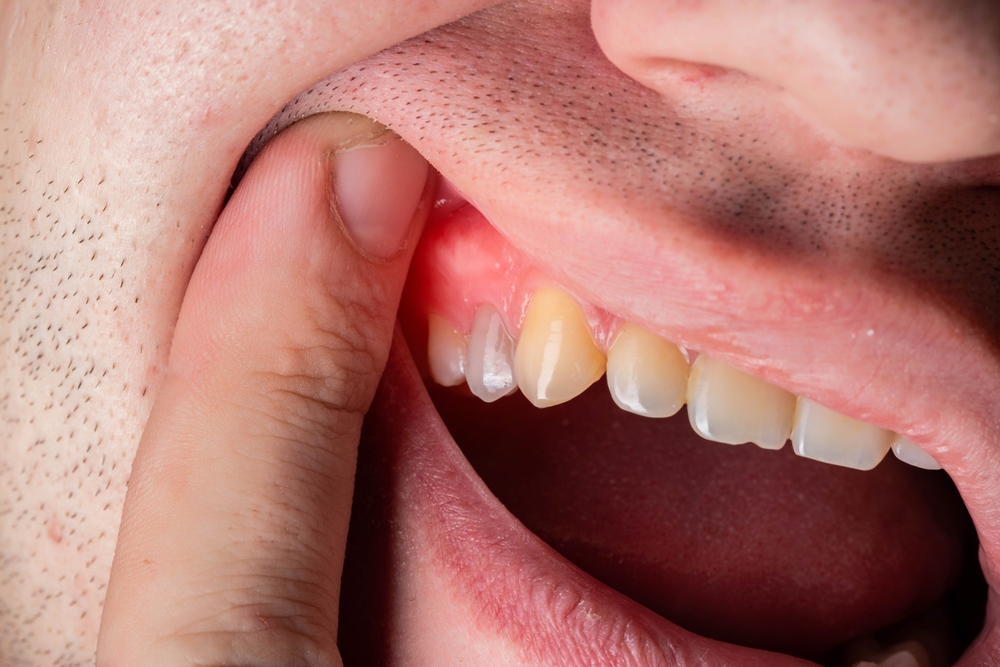What Dental Implant Patients Should Know About Gum Disease

Missing teeth can impact your ability to eat and speak properly. Fortunately, dental implants are a fantastic option to replace missing teeth and support your jawbone. However, if you have gum disease, this can put you at risk for several oral health issues and risk dental implant failure.
Explore the issues that can arise from gingivitis and periodontitis and how gum disease can impact dental implant placement at my practice, Premier Dental and Implant Center in Orland Park, IL.
What Is Gum Disease?
When plaque and tartar build up on teeth due to poor oral hygiene, it can increase the chances of gum tissue infection. This inflammation is known as gum disease (periodontal disease). The early stage of gum disease is gingivitis, and advanced gum disease is known as periodontitis.
Gum Disease Symptoms
Signs of gum disease vary and can be subtle or more obvious. Symptoms include:
- Gum Irritation
- Bleeding Gums
- Sensitive Teeth
- Loose Teeth
- Receding Gums
- Bad Breath
Gum Disease and Your Oral Health
Gum disease is common, with 46% of all adults aged 30 years or older showing signs of gum disease and about 9% of adults experiencing severe gum disease, according to the CDC. Gum disease may seem minor, but if left untreated, it can have a serious effect on your oral health and require more extensive dental treatments later.
Gum disease can cause issues such as:
- Gum Recession — Receding gums may seem minor, but as the gum tissue recedes, it can expose the tooth roots. This can be painful and lead to infections. In some cases, the gums are unable to support the teeth, which can lead to tooth loss.
- Tooth Loss — Tooth loss caused by gum disease can be the result of gum recession, infection, or decay. If you have previously lost a tooth due to gum disease, it can cause your other teeth to shift and even lead to further tooth loss.
- Tooth Decay — Gum disease can cause bacteria to enter the tooth through tiny holes or cracks, causing tooth decay and infections in the tooth root. This requires decay removal, along with a filling, or root canal therapy and a dental crown.
- Jawbone Atrophy — Jawbone atrophy often occurs with missing teeth. The jawbone relies on the tooth roots to provide stimulation. However, untreated gum disease can also cause the jaw to deteriorate or exacerbate the deterioration caused initially by missing teeth. When the jawbone deteriorates, it can cause a sunken facial appearance and result in further tooth loss.

Gum Disease and Dental Implants
Gum disease can have devastating consequences for your oral health. If you have missing teeth, dental implants are considered the gold-standard tooth replacement option. However, people with gum disease require preparatory treatment before dental implant placement can occur. A healthy foundation is crucial to the success of your dental implants and can minimize the risk of other issues.
Per-Implantitis
Dental implant placement with active gum disease can also lead to infection. When the soft tissue around a dental implant is infected, this is known as peri-implantitis. Since the implant post is inserted directly into the jawbone, peri-implantitis can expose the bone to infection. This not only puts your jawbone at risk, but it can also cause infections in the sinuses and other teeth.
Dental Implant Failure
Dental implant failure occurs when the implant fails to fuse to the jawbone in a process called osseointegration. This may lead to the need to remove the implant and re-do the procedure. In some cases, if the bone around the implant is not intact, bone grafting may be necessary.
How Can I Reduce My Risk of Gum Disease?
In some cases, gum disease can occur due to genetics, health conditions, or even medications. However, there are ways to reduce your risk of developing gum disease before or after implant placement to improve your chances of a successful procedure:
- Maintain Good Oral Hygiene—Proper brushing and flossing can prevent build-up as well as tooth decay.
- Visit Your Dentist—Visiting my Orland Park dental practice for routine exams and cleanings can play a big part in preventing or eliminating gum disease. A professional cleaning can remove plaque and tartar in hard-to-reach places. It can also remove build-up that your toothbrush is unable to remove. Another benefit of visiting my practice regularly is I can spot problems such as early gum disease and treat it before it progresses and causes other issues.
- Do Not Use Tobacco Products—Tobacco use has been linked to several overall health and oral health issues. It also increases your risk of dental implant failure. It is best to stop using all tobacco products.

Preparatory Gum Disease Treatment for Dental Implant Patients
If you have gum disease and also need dental implants, preparatory periodontal care is needed first. Treatment depends on the severity of your gum disease, but may include:
Professional Cleaning
A professional cleaning may be all you need if you have early-stage gum disease. By removing the plaque and tartar causing the irritation, your gums can heal and create a healthy foundation for your dental implants. It is important that you practice proper brushing and flossing after your cleaning to prevent new build up.
Scaling and Root Planing
Scaling and root planing is one of the most effective ways to treat gum disease. During this procedure, I clean above and deep below the gumline. I then smooth any rough areas on the tooth surface or tooth root surface. This eliminates areas where build-up can occur and provides the gums with a smooth surface to reattach to.
When Can I Get Implants Placed After Preparatory Treatment?
Following preparatory periodontal treatment, you will be given time to heal. This will vary depending the severity of your gum disease. It is also important to remember that every patient heals at a different rate. Once your periodontal treatment is complete, you will most likely have an appointment for your dentist to reexamine you to ensure the gum disease is resolved.
If you have other issues as a result of gum disease, such as jawbone atrophy, you may require further treatment, such as bone grafting.
During your initial consultation at my Orland Park office, I will develop a custom treatment plan to address all of your concerns. Once that plan is created, I should be able to provide you with a more accurate treatment timeline.
I Can Help Improve Your Gum Health
Dental implants can be life-changing for patients experiencing tooth loss. However, creating a healthy foundation is an important step to ensure the success and safety of dental implant surgery. Take the first step on your smile transformation journey. Request a consultation at my Orland Park office to get started.
 About Yamen Akhras, DDS
About Yamen Akhras, DDS
Dr. Yamen Akhras completed training in dental implants from the Misch Institute and the Urban Regeneration Institute. He specializes in treating gum disease, placing implants, and bone and gum grafting.
Read Dr. Akhras's Full Bio | All Posts by Dr. Akhras


